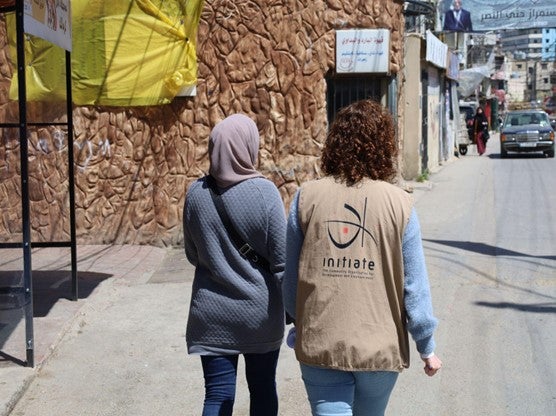In the Words of Suzan: “Beyond Addressing Immediate Food Insecurity, our Kitchens are Promoting Community Solidarity”
Date:
Suzan is a 32-year-old Palestinian woman residing in the Beddawi refugee camp in north Lebanon, 5 km northeast of the city of Tripoli. Established in 1955, the camp bears witness to the compounded challenges faced by its Palestinian refugee inhabitants. During the Lebanese Civil War (1975-1990) and subsequently the Syrian War, which erupted in 2011, the Beddawi camp has accommodated several waves of displacement. It became a haven for those seeking solace amidst turmoil.
In 2023, Suzan joined UN Women's established community kitchen within the Beddawi camp as an outreach worker, raising awareness on cooking on a budget and providing hot meals to families living in vulnerability as part of UN Women’s project “Humanitarian Assistance to Women by Women: Women at Work to Reduce Period Poverty and Food Insecurity in the Lebanon Crisis.” Implemented by The Community Organization for Development and Empowerment (INITIATE) and Women Programme Association (WPA), with the generous funding of the Government of Australia, the project aims to provide women with cash-for-work opportunities through the production and distribution of hot meals to families in need.

Community kitchen outreach worker Suzan and INITIATE M&E manager walking in Beddawi camp. Photo: INITIATE.
“I was married young, at the age of 16, in the early years of marriage, I faced health issues, including a battle against uterine tissue cancer. Thankfully, I fully recovered, but my family and I were faced with mounting debts and hope was dwindling.
Due to Lebanon’s acute economic crisis since 2019 and with the worsening of the situation, my family of four children and husband were barely able to make ends meet, and we struggled to put food on the table. With the decrease in job opportunities and soaring inflation, I found myself often grappling with a sense of hopelessness and desperation.
Last year, my parents heard of the community kitchen initiative run by INITIATE and WPA in a neighborhood nearby, and I decided to enroll myself.
In the context of this initiative, I, along with 119 other women, collectively contribute to the production and distribution of hot meals to vulnerable Lebanese and Palestinian households in the neighborhoods of Ein El Helweh, Rashidieh, and Beddawi camp. Beyond addressing immediate food insecurity[1] this initiative gave me hope and a chance to achieve economic and social empowerment.
I work on spreading awareness on healthy eating habits, within the community. I accompany female colleagues who were in charge of delivering hot meals, every day to nearby households. While my coworker hands out the meal, I inform the families about healthy and nutritious food, and give them guidance on how to prepare these meals on a tight budget. My advice was well received, and the families we visited expressed their gratitude, promising to apply this newly acquired knowledge to their lives.
As a mother of four, my aspirations extended beyond personal triumphs. The initiative has equipped me with newfound skills. I am now an inspiration to my daughters; I strongly advocate for their education and financial independence. With the income I earned through the project, I can now not only provide for my family but also alleviate the debt that has burdened us for so long.
This project made my life better. Beyond the positive impact on the community, the initiative has illuminated the bright side of life in the Beddawi camp, proving that even in the face of adversity, a collective action rooted in empowerment can sow the seeds of enduring solidarity.”
Suzan is one of 290 women actively engaged in seven UN Women community kitchens across Lebanon, vividly demonstrating the profound impact of community-led efforts. Funded by the Government of Australia, through these kitchens, more than 120,000 nutritious meals have been distributed to over 1,500 households, positively impacting the lives of over 5,700 individuals to date. The provision of hot meals not only aids in reducing food expenses for those in need but also ensures a reliable source of sustenance. This strategic intervention enables vulnerable families to redirect their saved resources toward other essential needs, exemplifying the transformative potential of community-driven initiatives.